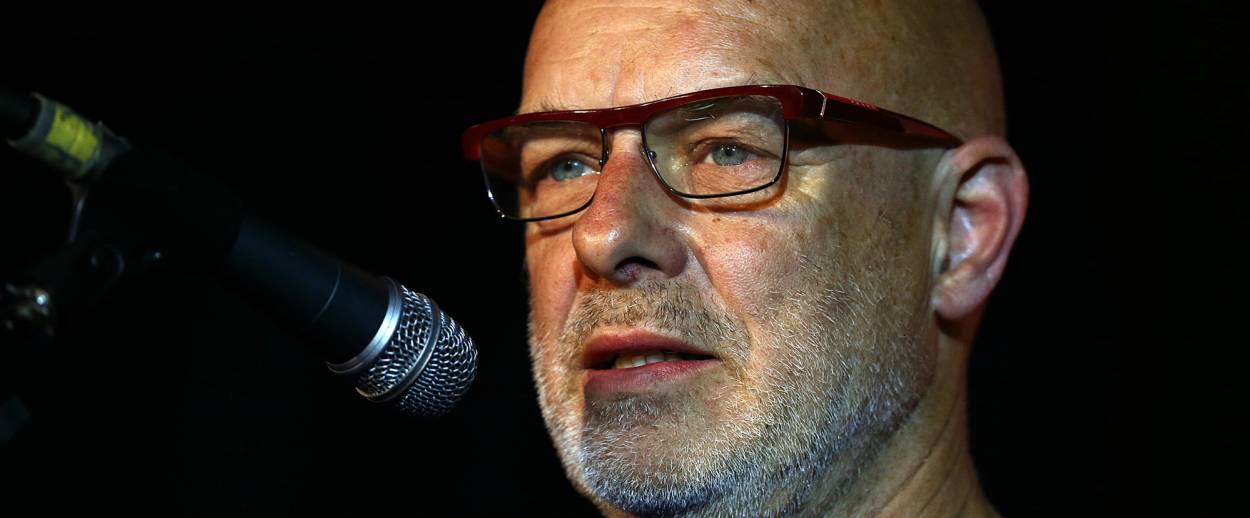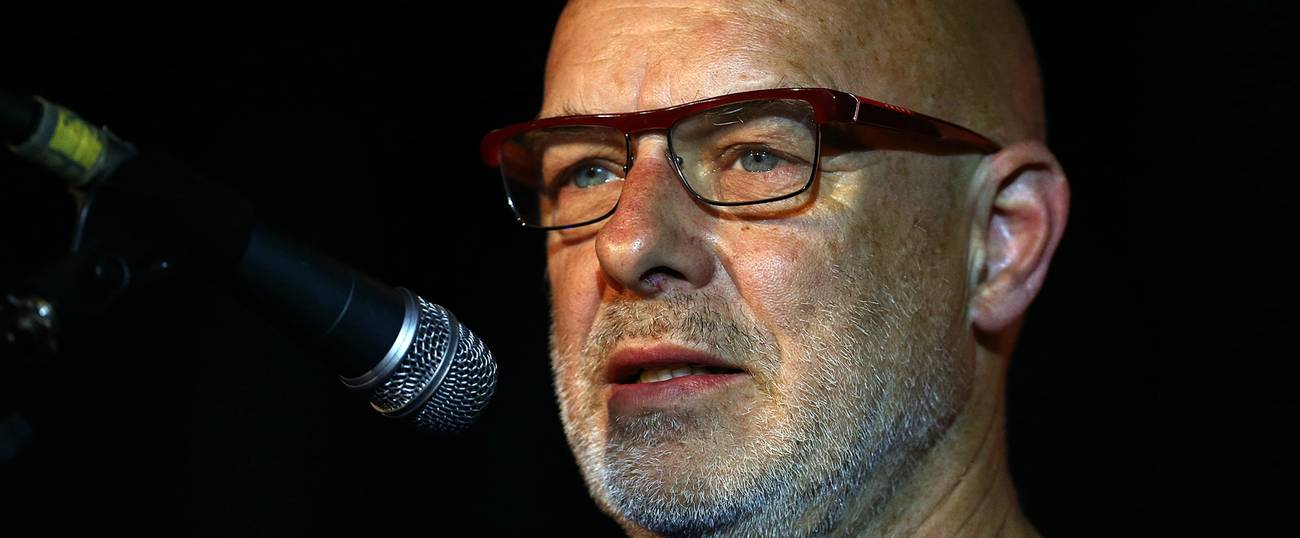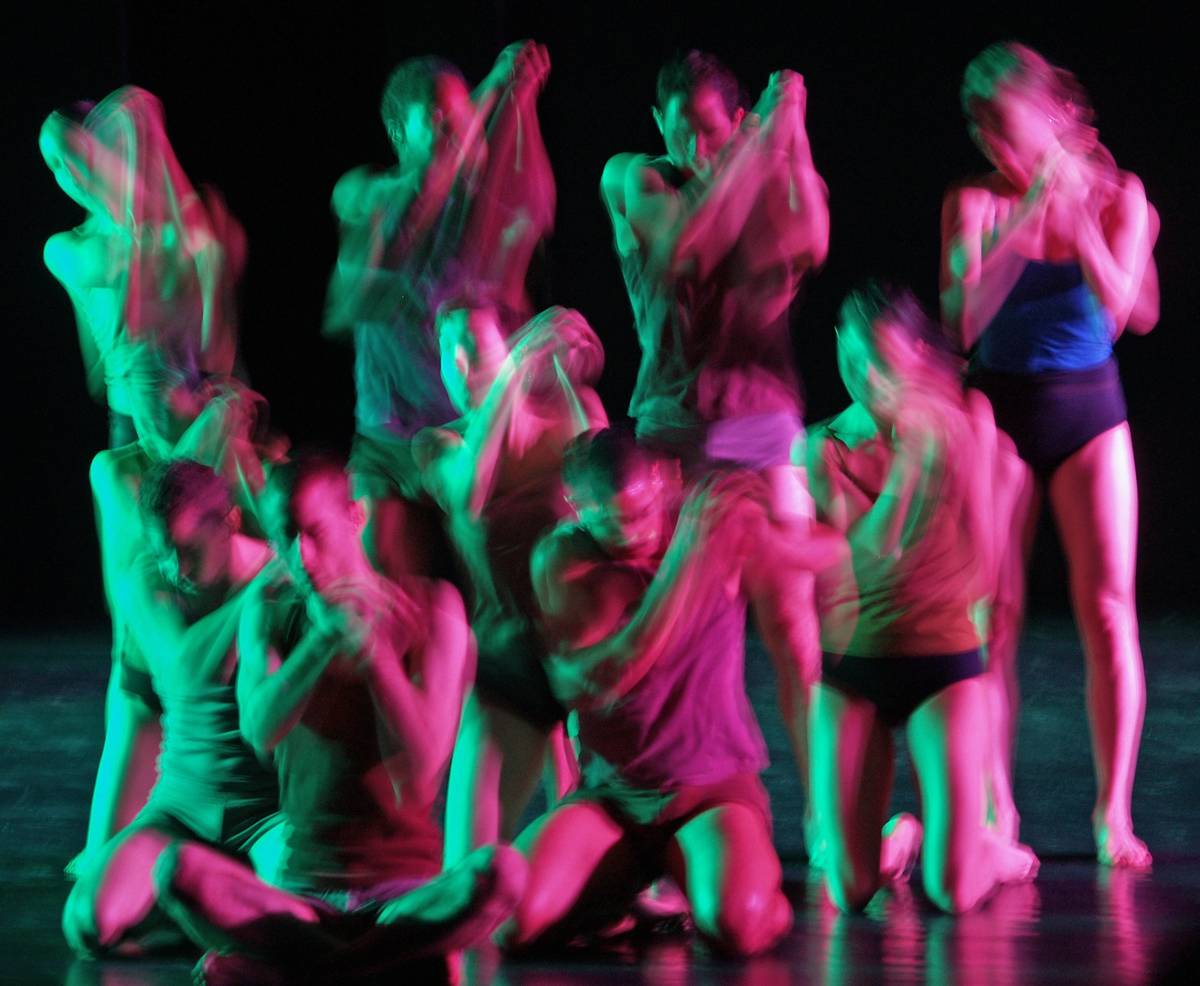The Eno Paradox: Genius Musician, Nauseating BDS Leader
Brian Eno is not allowing an Israeli dance company to use his music at an Italian festival because the event is sponsored by the Israeli government




Brian Eno is one of the towering musical figures of the last 40 years, but there are a couple of major points against him: He once produced a Coldplay album (albeit a pretty good one!), and he’s one of the leading figures in the Boycott, Divestment, and Sanctions campaign aimed at Israel. And he’s back at it.

On Sept. 7, Eno announced his displeasure at the Tel Aviv-based Batsheva Dance Company’s use of music from his 1993 ambient album Neroli, reported The Guardian. Notably, Eno objected not to the use of his music by Israeli artists, but rather to its possible appearance at the TorinoDanza festival in Turin, Italy, where Batsheva’s performance would be partially funded by the Israeli government. “To my understanding, the Israeli embassy (and therefore the Israeli government) will be sponsoring the upcoming performances,” Eno wrote in a statement. “And, given that I’ve been supporting the BDS campaign for several years now, this is an unacceptable prospect for me.”
Even with this distinction in place, Eno’s rationale is patronizing in the extreme. He explains that he understands the difficult position that Israeli artists are in at the moment, and that he acknowledges Batsheva has shown “some sympathy” for Palestinians over the years. But for Eno, who does not live in Israel and actively encourages other people not to visit or work in the country, it’s not enough simply to live out the contradictions of life as an Israeli artist as best and as morally one can. He sees little meaningful division between Israeli artistic performances in Europe and Israeli propaganda; therefore nothing short of absolute purity or complete artistic silence will win his stamp of approval: “I feel that your government exploits artists like you, playing on your natural desire to keep working—even if it does mean becoming part of a propaganda strategy,” Eno wrote in a statement. “Your dance company might not be able to formally distance itself from the Israeli government but I can and will: I don’t want my music to be licensed for any event sponsored by the Israeli embassy.”
Of course, without support from the embassy, it’s possible Batsheva wouldn’t have been able to tour Italy at all. And isn’t it interesting that an Israeli embassy would support the work of artists who are apparently critical of their country’s policies, or that an Israeli dance troupe would decide to center one of their pieces around the work of someone who they undoubtedly know to be a prominent Israel boycotter? It certainly isn’t interesting to Eno. And keep in mind that Eno isn’t profiting from this group’s use of his work, or from the embassy’s sponsorship of the group. He isn’t financially complicit in whatever crimes he believes Israel has committed, and doesn’t even seem to realize that Batsheva had been using Neroli in its performances since as early as 2008. His concerns are even deeper and creepier than that: Eno wants to control the use and interpretation of his own work, in such a way that denies Israelis—and, it seems, only Israelis—a right to artistic license.
This is pretty low stuff. Luckily or not, depending on how you look at it, Eno’s long-running obsession with the world’s only majority-Jewish country is a footnote to a musical career the greatness of which no amount of political zaniness can erase.
Eno’s views on Israel do nothing to erode the genius* of his art. There is no nexus linking the stupefying “Everything Merges With the Night” to his opposition to the Jewish state or his astounding condescension towards the Batsheva dance company, except that each happen to be contained within the mind and spirit of the same individual. I’m more than happy to sidestep any deeper exploration of what this co-location of artistic accomplishment and awful politics could mean: even if there were some provable, organic link between Eno’s art and his political views, the power of his work exists independent of any banal or adulterating earthly forces. His music deserves to be felt and experienced on its own, and it is political largely in its ability to remind its listeners that there are forces higher and greater and more profoundthan mere politics. As an artist, Eno is entitled to the same benefit of the doubt, and the same generosity of spirit, that he refuses to extend to his admirers in the Batsheva dance company.
*No, Eno isn’t a greater pop star or songwriter or a more far-sighted artistic visionary than his friend and contemporary David Bowie, but I know who I’d rather listen to at this exact second: Brian Eno.
Nothing on Low (an album in which Eno was deeply involved) creates the same atmosphere of existential gravity as “On Some Faraway Beach,” and nothing on Heroes (also an Eno collaboration!) is as manically and exuberantly weird as “Mother Whale Eyeless” or “Third Uncle.” It’s a damning indictment of popular taste that “Everything Merges With the Night,” a four-minute distillation of the sublime in pop music, isn’t universally considered one of the 10-to-15 greatest songs of the 1970s, or ever, for that matter. Even Eno’s less-remembered work oozes with creativity and risk-taking: No Pussyfooting, the first of four collaborations with Robert Fripp, saw Eno’s outre production sensibilities pushing the King Crimson guitarist to places he’d never ventured before. You may have heard of Ambient 1: Music for Airports, but Ambient 2: The Pleteaux of Mirror is no less hypnotic or disquieting.
The list goes on: Eno’s two collaborations with David Byrne, the uncategorizable My Life in the Bush of Ghosts and the more recent, more traditional pop album Everything That Happens Will Happen Today, couldn’t be more different, but both will probably be listened to 20 or even 30 years from now. Just go ahead and burn the rest of your afternoon listening to Eno records, starting 1974’s Here Come the Warm Jets, which kicked off a hot-streak solo records—you’ll find that his most important similarity with Bowie is that they both sustained a multi-decade career in music without running out of ideas.
Armin Rosen is a staff writer for Tablet Magazine.